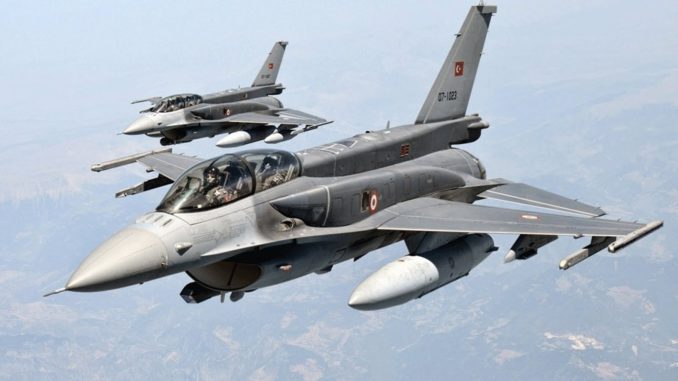
 CEMIL ERTEM*
CEMIL ERTEM*
After the U.S. Department of Defense announced that President Donald Trump approved the supply of heavy weapons to the Syrian Democratic Forces (SDP), a structure that predominantly consists of the Democratic Union Party (PYD), the People’s Protection Units (YPG) and the outlawed PKK, to use in the Raqqa operation, the lira depreciated against the dollar. Soon after, however, Turkish assets began being priced with their real values on the global markets again.
Everybody knows that this statement by the U.S. will not have a negative impact on Turkey in the medium and long term. This is because Turkey is no longer the Turkey of the previous century. It has theses in line with its own interests and it will inarguably defend them to the end. This shows that Turkey is already economically strong.
It is very clear that Turkey will continue to take all kinds of measures against terrorist threats to its national security and interests, no matter where they come from. Turkey will never compromise and will not step back on this issue.
Certainly, when the U.S. took one step against Turkey’s desire in the region in the previous century, this would radically shake Turkey’s economic position on a global level. In such situations, Turkey would come around as the U.S. desired, and things would be handled in this way. Now, however, neither of them will happen as Turkey will speak of the U.S.’s mistake and will never fall into line. This is because the negative consequences of the unilaterally bad decisions made by the U.S. like this in the past are known to everyone. Therefore, the U.S. will learn by experience that makeshift solutions based on terrorism in the region are a blind alley.
On the other hand, if we would like to address Turkey’s insistence on its thesis in terms of the economy, it is very clear that this is a conflict of interest depending on different approaches to evaluate the resources and economic potential of the region. Therefore, Turkey can be negatively affected in the economy in the medium and long term only if it ignores its own interests and blindly accepts the U.S.’s interests.
If Turkey allows a terrorist structure right on its border, it becomes, above all, a threat against its economic stability. Trump may ask this of American investors in Turkey. For instance, he may ask it of the regional headquarters of one of the largest U.S. banks in Istanbul.
Second, Turkey is now the real player in the evaluation of market dynamics and energy resources of the region and will not give up this position. Moreover, Turkey’s absence from these areas means that the market dynamics and energy resources of the region remain outside the world economic cycle. Yes, Turkey cannot benefit from this, but if Turkey cannot benefit, no one else can. Moreover, even if Turkey is not here, it has various alternatives in terms of energy and markets including Caucasian, Caspian, Eastern Mediterranean and energy resources, and the Turkish Stream is poised to carry Russian energy resources to Turkey.
On the day that Trump approved the supply of heavy weapons to the PYD and its apparatuses, John Roberts, a senior expert at the Atlantic Council Global Energy Center, told Anadolu Agency, “The Turkish Stream project will greatly contribute to the energy security of both Turkey and Europe. Moreover, the Trans Adriatic Pipeline (TAP), which constitutes the European section of the Trans-Anatolian Natural Gas Pipeline (TANAP) project, will have an additional capacity of 10 billion cubic meters. When the TAP goes into operation in 2020, the only resource that can provide this additional capacity may be Gazprom, which will supply natural gas to the second line of the Turkish Stream.” This means that Russian resources are a partner to the Southern Gas Corridor (SGC). As such, Russia’s complementary role in the SGC and its cooperation with Turkey in this area means the birth of a new union beginning with energy in the Caucasus.
I wrote the following passages before the referendum: “If Turkey votes for the constitutional change in the April 16 referendum, namely for further stability and democracy, the old face of Europe, which has inclined toward fascism with Germany, will lose the first round. From an economic point of view, this means the first step toward a new global system based in Beijing, London and Istanbul, which will lead to the emergence of a new energy market order. Far Eastern ports and trade centers will be connected to eastern and southern Europe via Turkey by China’s “One Belt One Road” (OBOR) megaproject. The same is true for energy as well.
Currently, Europe consumes some 600 billion cubic meters of natural gas, however, northern Europe can produce just one-third of this. In other words, it needs to import 400 billion cubic meters of the natural gas it needs. It is estimated that the EU’s annual natural gas consumption will reach 760 billion cubic meters by 2030. The need for natural gas will also rise in line with the closure of nuclear power plants – which means that Europe will need to import 600 billion cubic meters of natural gas annually. It will get the natural gas through pipelines that will be divided into two main streams in the future: The North Turkish Stream and the Southern Gas Corridor, which has to include Levantine resources, in addition to Caspian natural gas. This is a dynamic that will change the political and economic position of Israel.”
Also, the Mosul and Kirkuk energy lines can reach the Mediterranean and the SGC in the form of natural gas only through Turkey. Kurdistan Regional Government President Masoud Barzani knows this as well. Otherwise, KRG-Turkey economic and political relations are going through a golden age. The Barzani administration knows that stability in Turkey and cooperation with Turkey means peace and welfare for them as well. Therefore, the U.S. should know that terrorist organizations in Syria do not really represent Kurds. Turkey has many alternatives in this area, but the U.S. has no alternative other than Turkey in the medium and long term.
Turkey voted for the constitutional change and the system has changed in favor of stability. Turkey will determine the supply and demand dynamics and market and new trade structuring of the region and Europe. The U.K. has seen this major change, but the U.S. is yet to see it.
*Cemil Ertem is a Turkish columnist at Daily Sabah Turkish newspaper
(Published in Daily Sabah on Friday, May 12, 2017)



